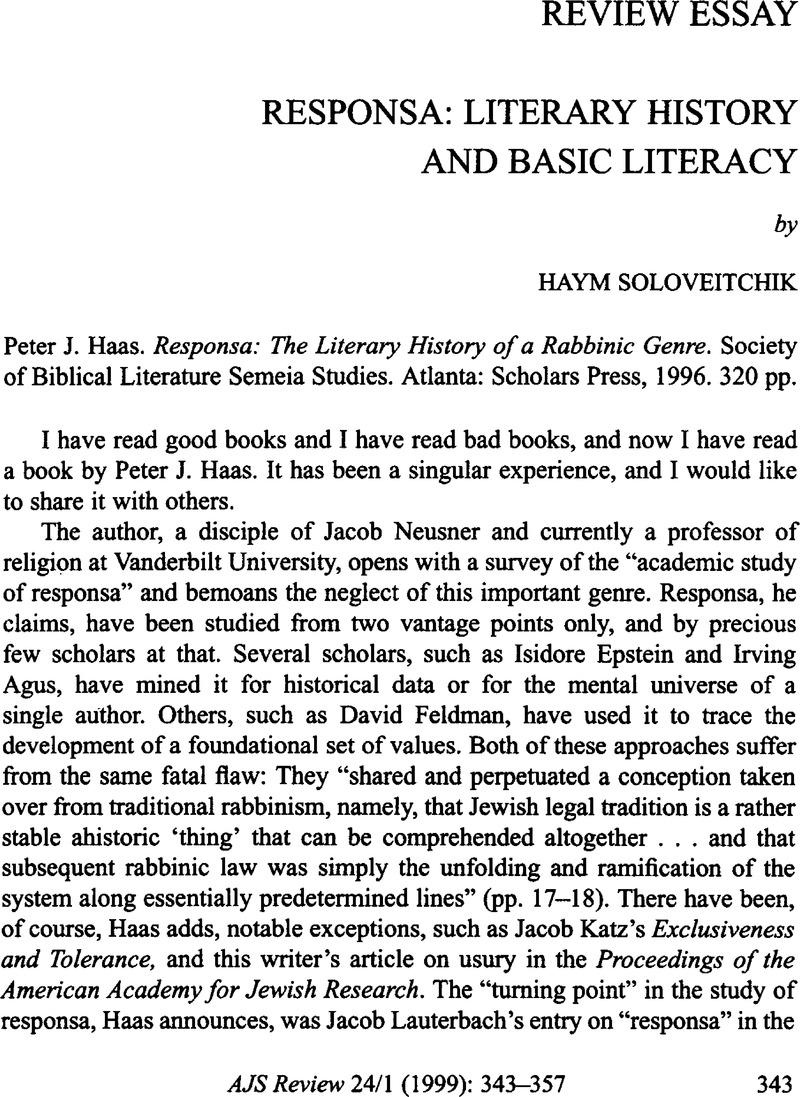Article contents
Responsa: Literary History and Basic Literacy
Published online by Cambridge University Press: 15 October 2009
Abstract

- Type
- Review Essay
- Information
- Copyright
- Copyright © Association for Jewish Studies 1999
References
1. In the Gershom Scholem Jubilee Volume, edited by R. Z. W. Werblowsky et al.(Jerusalem, 1968), Hebrew sec., pp. 115–148, and reprinted in Jacob Katz, Halakhah ve- Qabbalah (Jerusalem, 1984), pp. 353–387.
2. The word ![]() does, indeed, mean “to adhere.” In our context, it means, as Rashi explains, “to adhere to the practice of eating on Yom Kippur.”
does, indeed, mean “to adhere.” In our context, it means, as Rashi explains, “to adhere to the practice of eating on Yom Kippur.”
3. Haas's reading of the verse is characteristic of his approach to texts. The verse reads “Thou shalt not bring the hire of a whore...into the house of the Lord thy God for any vow.” The last three words make it clear that we are dealing with a sacrifice offered in payment of a vow, not with the hiring of an escort service. Haas simply ignored the ending.
4. I say “over ninety” because I stopped counting when I reached that number. The actual count is considerably higher.
5. Haas is on a first-name basis with many of the great halakhic figures of the past.
6. The passage in Rashi's responsum reads (and I italicize where the actual text differs from Haas's rendition): “But i f...[he suddenly] appears with a writ of dowry [based] on (the passage in Kiddushin 9b which reads:) ‘How much do you give [as a wedding gift] for your son?’ 'such and such a sum [i.e.. an oral commitment]. If they proceeded to marry [on that basis], she [the bride] acquired [the gift].” (end quote) [i.e., the plaintiff's writ attests that such an oral commitment was made] and he says, “I acquired [the share in the partnership] from the moment [of marriage] and [therefore] I am your partner whether you wish it or not.”
7. ![]()
![]() and
and ![]() are all unrecognized. References: B. Batra 173b, Shevu'ot 31b, Kiddushin 9b (for both
are all unrecognized. References: B. Batra 173b, Shevu'ot 31b, Kiddushin 9b (for both ![]() ), B. Mesi'a 14a, B. Mesi'a 101b, Sanhedrin 32b. Examples of mistranslations:
), B. Mesi'a 14a, B. Mesi'a 101b, Sanhedrin 32b. Examples of mistranslations: ![]() does not mean “right,” but “power of attorney”; pi
does not mean “right,” but “power of attorney”; pi ![]() does not mean “too much litigation,” but “court proceedings with fraudulent claims”;
does not mean “too much litigation,” but “court proceedings with fraudulent claims”; ![]() does not mean “from those against whom she holds liens” (p. 144), but “from those sureties who have guaranteed her [commitment].” No securities have been mentioned in the responsum, nor is there any mention of such a weird arrangement as that of the debtor (i.e., the widow) taking a lien against her own sureties to ensure the latter's payment should the debtor herself default! The defendant, in this responsum, simply replies to the plaintiff that his remedy lies with the sureties.
does not mean “from those against whom she holds liens” (p. 144), but “from those sureties who have guaranteed her [commitment].” No securities have been mentioned in the responsum, nor is there any mention of such a weird arrangement as that of the debtor (i.e., the widow) taking a lien against her own sureties to ensure the latter's payment should the debtor herself default! The defendant, in this responsum, simply replies to the plaintiff that his remedy lies with the sureties.
8. For example, in the continuation of the above-cited passage, Haas's translation reads: “He has no authority to place others under her obligation because of her gift such that their claim is stronger than hers.” The Hebrew reads: “She [the widow] cannot, by gift, empower others [i.e., derivative claimants] with rights greater than her own.”
9. Pp. 178–180. In the space of three pages, the article is cited as “Al derekh ha-pilpul” (n. 3), “Al Kerekh [sic] Ha-Pilpul” (n. 4), and “derekh Ha-pilpul” (n. 9).
- 1
- Cited by




